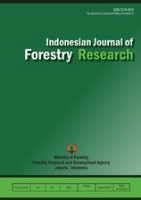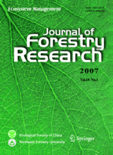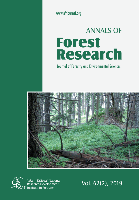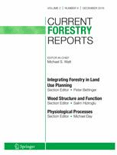
Madera y Bosques
Scope & Guideline
Pioneering Insights into Forestry Challenges
Introduction
Aims and Scopes
- Sustainable forest management:
The journal focuses on methodologies and strategies that promote the sustainable use of forest resources, ensuring ecological balance and conservation of biodiversity. - Ecological and environmental studies:
Research published in the journal often examines interactions within forest ecosystems, including species diversity, ecosystem services, and the impacts of climate change on forest health. - Restoration and rehabilitation of degraded areas:
The journal includes studies that explore techniques and practices for restoring degraded forest lands, emphasizing the importance of reforestation and ecological restoration. - Socio-economic aspects of forestry:
There is a significant emphasis on the socio-economic dimensions of forestry, including the valuation of ecosystem services, community involvement in forest management, and the impact of forestry on local economies. - Technological advancements in forestry:
Research on innovative technologies, such as remote sensing, GIS, and LIDAR for forest inventory and management, is a key area of focus, showcasing how technology can enhance forest management practices.
Trending and Emerging
- Climate change impacts on forest ecosystems:
Research examining both negative and positive impacts of climate change on various forest types, particularly mangroves, has become increasingly relevant, highlighting the urgent need for adaptive management strategies. - Biodiversity conservation in forest management:
There is a growing emphasis on studies that explore biodiversity conservation within forest ecosystems, particularly how management practices can support species richness and ecosystem resilience. - Community-based forest management:
Participatory governance and community involvement in forest management practices are trending topics, reflecting a shift towards inclusive approaches that empower local stakeholders. - Technological applications in forestry research:
The use of advanced technologies, such as satellite imagery and machine learning for forest monitoring and management, is emerging as a significant theme, showcasing the integration of technology in ecological studies. - Ecosystem services valuation:
The trend towards quantifying and valuing ecosystem services provided by forests is gaining importance, as it helps in understanding the economic benefits of forest conservation and sustainable management.
Declining or Waning
- Traditional timber production methods:
Research on conventional timber production techniques is less frequently addressed, possibly due to a shift towards more sustainable and multi-functional approaches to forestry. - Single-species forestry practices:
There is a noticeable decline in studies focusing exclusively on single-species management practices, as the journal increasingly emphasizes biodiversity and mixed-species approaches. - Historical forestry practices:
Papers discussing historical forestry practices and their impacts on current ecosystems have become less common, indicating a shift towards contemporary issues and future-focused research. - Generalized forest health assessments:
The journal has moved away from broad assessments of forest health towards more specific studies that address complex interactions within forest ecosystems, including climate change impacts. - Traditional ecological knowledge without integration:
While traditional ecological knowledge remains important, there is a decrease in studies that do not integrate this knowledge with modern scientific approaches or community participation.
Similar Journals

Revista Forestal Mesoamerica Kuru-RFMK
Exploring solutions for Central America's forest challenges.Revista Forestal Mesoamerica Kuru-RFMK is a vital academic platform dedicated to the advancement of forest science and management within the Mesoamerican region. Published by the Instituto Tecnológico de Costa Rica, this journal has been an Open Access resource since 2011, ensuring that critical research is accessible to a global audience. With an ISSN of 2215-2504, it aims to foster collaboration and knowledge exchange among researchers, professionals, and students eager to address the pressing challenges facing forests in Central America. The journal prioritizes interdisciplinary studies related to forest ecology, conservation, and sustainable management practices, making it an indispensable reference for anyone interested in enhancing forest health and biodiversity. By contributing to this resource, scholars can impact policy and practice while enriching the academic community’s understanding of Mesoamerica's unique forest ecosystems.

Indonesian Journal of Forestry Research
Empowering researchers with vital insights in ecology and forestry.The Indonesian Journal of Forestry Research is a distinguished, peer-reviewed academic journal published by the Ministry of Environment & Forestry of Indonesia. With an ISSN of 2355-7079 and E-ISSN 2406-8195, this journal has been an Open Access platform since 2014, fostering international collaboration and knowledge sharing in the fields of ecology and forestry. As of 2023, the journal holds a respectable Q3 category in both Ecology and Forestry, reflecting its contribution to the science community. It ranks #99/174 in Forestry and #305/461 in Ecology in Scopus, indicating its growing influence in the respective fields. Aimed at researchers, professionals, and students, the Indonesian Journal of Forestry Research provides vital insights and findings, supporting sustainable forestry practices and environmental management in Indonesia and beyond. With an emphasis on innovative methodologies and applied research, this journal stands as a pivotal resource for those dedicated to advancing forestry science and ecological research.

JOURNAL OF FORESTRY RESEARCH
Elevating forestry studies to new heights of excellence.JOURNAL OF FORESTRY RESEARCH, published by Northeast Forestry University in China, stands as a pivotal platform for advancing the field of forestry science. With an ISSN of 1007-662X and an E-ISSN of 1993-0607, this esteemed journal has maintained its commitment to disseminating high-quality research since its inception in 1997, converging into a recognized authority through the years. Currently boasting a Q1 ranking in the Forestry category for 2023, it ranks 18th out of 174 journals in its field on Scopus, highlighting its vital role in shaping contemporary forestry studies. The journal focuses on a broad spectrum of topics pertinent to forestry, including sustainable forest management, ecology, and conservation efforts, making it an indispensable resource for researchers, professionals, and students alike. Although it is not an open-access publication, the insights shared within its pages promise to contribute significantly to the advancement of knowledge and practices in forestry. The journal's significant impact and relevance are underscored by its operations from Harbin, People's Republic of China, where it continues to foster scholarly communication in the world of forestry research.

FOREST SCIENCE
Exploring innovative solutions for ecological challenges.FOREST SCIENCE, published by Oxford University Press Inc, is a pivotal journal in the field of forestry and ecological modeling, boasting an impressive track record since its inception in 1970. With an ISSN of 0015-749X and E-ISSN 1938-3738, the journal provides a valuable platform for the dissemination of high-quality research and studies that address contemporary challenges in forestry and ecology. It ranks in the Q2 category for both ecology and forestry and holds a Q3 ranking in ecological modeling according to the latest evaluations, illustrating its significant contribution to these fields. The journal is accessible through various options, facilitating broad readership and engagement within the academic community. As part of its commitment to advancing knowledge and practices in forest management and conservation, FOREST SCIENCE seeks to bridge theoretical research with practical applications, making it an indispensable resource for researchers, professionals, and students alike.

Reports of Forestry Research-Zpravy Lesnickeho Vyzkumu
Shaping the landscape of sustainable forest management.Reports of Forestry Research-Zpravy Lesnickeho Vyzkumu, published by the FORESTRY & GAME MANAGEMENT RESEARCH INST in the Czech Republic, serves as a vital forum for the exploration and dissemination of cutting-edge forestry research. With an ISSN of 0322-9688 and an E-ISSN of 1805-9872, this journal provides insights into various dimensions of forestry, nature conservation, and environmental sciences, contributing to both regional and global ecological discourses. Although currently categorized in the Q4 quartiles for Forestry and Nature and Landscape Conservation as of 2023, the journal aims to foster collaboration among researchers, professionals, and students devoted to sustainable forest management practices. The Scopus rankings reveal its position within the environmental science community, highlighting its role in addressing pressing ecological challenges. As the field continues to evolve, Reports of Forestry Research anticipates growth in accessibility and relevance, an essential resource for those committed to advancing forestry science and conservation efforts.

Central European Forestry Journal
Bridging research and practice in forestry for a greener tomorrow.Central European Forestry Journal, published by SCIENDO, is a pivotal platform dedicated to advancing research and knowledge in the field of forestry. Since its inception in 2009, this Open Access journal has provided scholars and practitioners with unrestricted access to cutting-edge research findings, promoting collaboration and innovation within the forestry community. Based in Poland, the journal serves as a crucial resource for researchers, professionals, and students alike, addressing critical topics relevant to the management, conservation, and sustainable utilization of forest resources. The journal holds a commendable Q2 ranking in Forestry, with a notable rank of 51 out of 174 and a 70th percentile in Scopus's Agricultural and Biological Sciences category. With converged publication from 2017 to 2024, the Central European Forestry Journal represents an essential avenue for disseminating knowledge and fostering dialogue in an increasingly important field.

FORESTRY CHRONICLE
Advancing forestry knowledge for a sustainable future.FORESTRY CHRONICLE, published by the Canadian Institute of Forestry, is a leading journal dedicated to advancing knowledge in the field of forestry and environmental science. With a rich history of dissemination of impactful research since its inception, this journal plays a crucial role in bridging the gap between theory and practice for professionals, researchers, and students alike. Based in Canada, the journal is indexed in Scopus, ranking within the Q3 quartile for the field of Forestry and demonstrating its commitment to quality and relevance in agricultural and biological sciences. While it does not currently offer open access, its circulation extends internationally, ensuring a wide reach for innovative ideas and findings in forest management, conservation, and ecological sustainability. As a vital resource, FORESTRY CHRONICLE continues to foster dialogue and collaboration among stakeholders invested in the sustainable use of forest resources, making it an essential addition to your academic repertoire.

Sylwan
Fostering sustainable development in forestry across Europe.Sylwan, published by POLSKIE TOWARZYSTWO LESNE, is a key journal in the field of forestry, focusing on the science and practice of sustainable forest management and conservation. Operating since 1979 and releasing issues periodically, including those from 2011 to 2018 and from 2020 to 2024, this journal plays a vital role in disseminating research and advances in forestry practices particularly relevant to Poland and the broader European context. While currently not offering open access options, Sylwan maintains a Q4 ranking in the forestry category according to the Scopus database, highlighting its dedicated niche within the scientific community. The journal serves as an essential resource for researchers, professionals, and students seeking to enhance their understanding of forestry issues in a global and ecological framework. With a commitment to promoting innovative research, Sylwan supports the ongoing dialogue on forestry management and policies, ultimately contributing to the sustainable development of forest resources.

Annals of Forest Research
Connecting scholars to foster environmental stewardship.Annals of Forest Research is a peer-reviewed journal dedicated to advancing knowledge in the fields of forestry, ecology, and plant sciences. Published by EDITURA SILVICA in Romania, this journal has been an open access publication since 2008, providing a platform for researchers to share their insights and findings with a global audience. The journal operates under a rigorous selection process, reflected in its positioning within the Q2 category in Forestry and Q3 in both Ecology and Plant Science as of 2023. With Scopus rankings indicating a solid percentile among its peers, Annals of Forest Research continues to play a vital role in disseminating innovative research and fostering scholarly dialogue. Researchers, professionals, and students are encouraged to explore its diverse range of articles, which address both foundational and contemporary issues in forest management and environmental sustainability, contributing to the sustainable use and preservation of forest ecosystems.

Current Forestry Reports
Exploring the intersection of ecology and practical forestry.Current Forestry Reports, published by Springer International Publishing AG, stands at the forefront of forestry and ecological research, boasting an impressive array of quartile rankings in 2023 such as Q1 in Ecology and Forestry. With an ISSN of 2198-6436, this journal has emerged as a pivotal platform for disseminating innovative research findings and insights critical to the sustainable management of forest ecosystems. Operating out of Switzerland, it covers a broad scope that spans from ecological theory to practical forestry applications and landscape conservation. Notably, it ranks #3 out of 174 in Agricultural and Biological Sciences: Forestry and #4 out of 211 in Environmental Science: Nature and Landscape Conservation, reflecting its high impact and relevance in the field, placing it in the top percentiles in multiple categories. This open-access journal endeavors to provide a comprehensive understanding of contemporary issues, trends, and methodologies in forestry and related disciplines, making it an indispensable resource for researchers, practitioners, and students who are dedicated to advancing knowledge and practices in forest science.